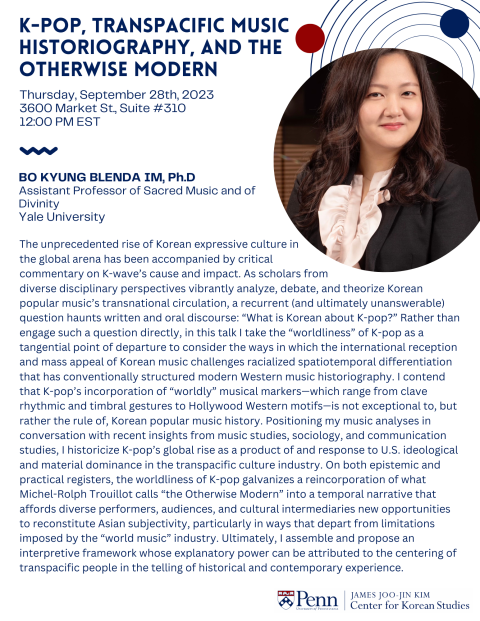
Korean Studies Colloquium
3600 Market Street, Suite 310 Philadelphia, PA 19104
The unprecedented rise of Korean expressive culture in the global arena has been accompanied by critical commentary on K-wave’s cause and impact. As scholars from diverse disciplinary perspectives vibrantly analyze, debate, and theorize Korean popular music’s transnational circulation, a recurrent (and ultimately unanswerable) question haunts written and oral discourse: “What is Korean about K-pop?” Rather than engage such a question directly, in this talk I take the “worldliness” of K-pop as a tangential point of departure to consider the ways in which the international reception and mass appeal of Korean music challenges racialized spatiotemporal differentiation that has conventionally structured modern Western music historiography. I contend that K-pop’s incorporation of “worldly” musical markers—which range from clave rhythmic and timbral gestures to Hollywood Western motifs—is not exceptional to, but rather the rule of, Korean popular music history. Positioning my music analyses in conversation with recent insights from music studies, sociology, and communication studies, I historicize K-pop’s global rise as a product of and response to U.S. ideological and material dominance in the transpacific culture industry. On both epistemic and practical registers, the worldliness of K-pop galvanizes a reincorporation of what Michel-Rolph Trouillot calls “the Otherwise Modern” into a temporal narrative that affords diverse performers, audiences, and cultural intermediaries new opportunities to reconstitute Asian subjectivity, particularly in ways that depart from limitations imposed by the “world music” industry. Ultimately, I assemble and propose an interpretive framework whose explanatory power can be attributed to the centering of transpacific people in the telling of historical and contemporary experience.
Bo kyung Blenda Im is Assistant Professor of Sacred Music and of Divinity at Yale University. She specializes in popular music and Christianity in Korea and the Korean Diaspora. Her research primarily addresses music studies and dialogues with religious studies, area studies, and anthropology. Blenda’s intellectual project concerns itself with unseating colonial epistemic legacies that condition the terms of inclusion and exclusion in the modern world. She critiques neo-Orientalist constructions of “Asia” by raising questions that pertain to race and racialization, coloniality, modernity, temporality, and the intellectual history of ethnomusicology. Blenda earned her PhD in Ethnomusicology from the Department of Music at the University of Pennsylvania. During her doctoral studies she was affiliated with the James Joo-Jin Kim Program in Korean Studies. Her book project, Transpacific Modernity and the Forgotten Constant: Race, Music, and Faith in Seoul reconceives transpacific musical modernity through a restorative chronopolitical framework.
 James Joo-Jin Kim Center for Korean Studies
James Joo-Jin Kim Center for Korean Studies